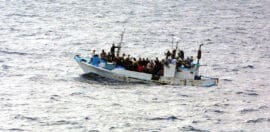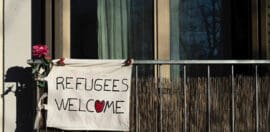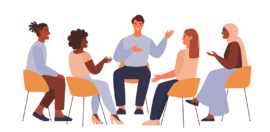A recipe for compassion

9 March 2023 at 2:50 pm
Loretta Bolotin has channelled 15 years working in the refugee sector into launching social enterprise and not for profit Free to Feed, which uses food to encourage openness and inclusion. She is this week’s Changemaker.
Growing up in the multicultural northern suburbs of Melbourne, it was only natural that Loretta Bolotin was drawn to the stories of the diverse communities around her. With her own family migrating from Italy as a result of economic hardship, Bolotin learned first-hand about the challenges and opportunities that came from starting a new life.
At university, she pursued her curiosity by studying community development and international security, which led to the formative opportunity to work with new arrivals at Christmas Island’s detention centre and later, becoming a weekly visitor to unaccompanied minors who had fled to Australia by boat.
Over the next 15 years, Bolotin supported hundreds of refugees and asylum seekers at all stages of their journeys, with frontline positions in leading humanitarian organisations including the Red Cross, Life Without Barriers and House of Welcome. In 2014, Bolotin relocated to Cairo in response to the influx of war-torn Syrian refugees.
“Connecting with them, feeling the privilege of their presence, hearing the quixotic mix of pain and hope in their journeys, resonated deeply with me, and evoked my childhood experiences and what I saw my family go through as they sought to resettle. My fascination and desire to do something in support of these people grew, and has been growing ever since,” said Bolotin.
Bolotin now leads social enterprise and not for profit Free to Feed, which she founded in 2015 to empower refugees and asylum seekers to overcome barriers to social and economic inclusion through the creation of shared food experiences, including cooking classes and catering, as well as training and employment programs.
In this week’s Changemaker, Bolotin unpacks the critical need to address public narratives around people seeking asylum in Australia; how food can be a great leveller; and why she’s never lacked motivation in her work.
What led you to launching Free to Feed?
I’ve been working in the refugee sector for 15 years now, and my greatest privilege has been the opportunity to meet hundreds of refugees and people seeking asylum, whether it be in slums on the outskirts of Nairobi, the energetic and smoggy streets of Cairo, or the prison-like detention centres on Christmas Island. Their stories are our stories, because their lives have been invariably impacted by a world that is deeply interconnected.
Discrimination, persecution, war – these events, even in far-flung parts of the world, do not happen in isolation, but are part of a global system that we are all a part of. I passionately believe that we all have a role to play to support people who have fled life-threatening danger to find safety, hope, freedom and a brighter future for themselves and their families. Who knows, it may be you or I one day.
All of these experiences, questions, wanderings and wonderings culminated in launching Free to Feed in Melbourne. The vision of Free to Feed is to empower refugees, people seeking asylum and new migrants to live meaningful, connected and productive lives in Australia.
Food is an amazing universal language, with as many words as there are incredible dishes, flavours, ingredients. From my earliest experiences working in the refugee sector, I witnessed eyes light up when food was even mentioned, and talents shine when cooking. Sharing traditional foods felt like the natural vehicle to support new arrivals and build on existing skills. It brings us together and tends to play a role in the cultures of all communities.
Through the delivery of our shared food experiences, Free to Feed helps people to find their place in Australia, to share their stories, and for the community to start to recognise the real value that they can contribute to society and the economy. It has been incredibly inspiring to assist people to get their very first job in Australia, connect with the local community and start to live the life they imagined as they journeyed towards us.
What does this role mean to you?
To me, this role means opportunity and responsibility. I say ‘opportunity’, not in a personal sense, but more in that I believe so strongly in the power of Free to Feed’s model of trauma-informed, strengths-based support that I see its growth and delivery in the community as such an opportunity to empower and improve lives. The model has been stress-tested many times over the years, undergone countless iterations, and is constantly evolving under the watchful eye of my big-hearted team.
For example, when two catastrophic global events happened in quick succession last year – the Taliban returning to power in Afghanistan, and then the war in Ukraine commencing – we focused on increasing the trauma-informed support we provide here, creating new strengths-based environments of care, compassion, community and employment for those affected.
We designed and launched our first ever pre-employment program, aimed at helping those in the most vulnerable early stages of resettlement, with the soft skills and information they need to begin their journeys to formal training and employment in Australia. After a successful initial pilot with 15 participants, we have now opened up a full program engaging 60 participants per year.
The responsibility I feel in this role really comes from the incredible people who have been drawn to Free to Feed’s mission from the very beginning and continue to bring life and love into our work – participants, staff, volunteers, supporters, donors and our loyal community who have not stopped coming along to our events, order our catering, and cooking with us.
They have breathed life into what could have been just a little idea eight years ago, that went the way of many other ideas. The support of the entire community has given us energy, resolve and conviction to continue, and my sense of responsibility is to meet, and hopefully exceed, their expectations in everything we do.
What is the biggest lesson you have learnt from working with refugees and asylum seekers for close to two decades?
The biggest lesson I’ve learned is that these words we use – ‘refugee’ or ‘person seeking asylum’ – refer to people who, by circumstances outside of their control, not by choice, have had to flee danger and search for a new home.
Seeking safety is an elemental act of survival. I would do the same, and everyone else I know would too. But, because of the politicisation of this issue, in Australia and abroad, people seeking asylum and refugees are regularly cast as villains, dehumanised, and portrayed as a threat. The antidote to this is to get to know one another, and remove the politics.
What we’ve found is that one of the best ways to get to know someone is by cooking or eating with them, and that’s why we do what we do at Free to Feed. To think of the conversations that have transpired at over 1,800 Free to Feed events over the past seven years, attended by over 30,000 people, really encourages me about the future. All of those sometimes fleeting, sometimes enduring moments of connection are the ingredients for a brighter and more empathetic future.
What are the challenges facing the refugee sector and how do we address these?
Climate change, rapid urbanisation and ongoing political instability is predicted to deeply aggravate the rate of growth of displaced people across the world. Alarmingly, current trajectories predict by the year 2050, there will be one billion forcibly-displaced people living globally.
In Australia, one of our biggest challenges is to address public narratives around people seeking asylum, which in turn affect political decision making, which in turn affects the lives of those seeking safety here. The impact of stigmatisation due to the politicised identities of refugees is still a huge challenge, and can lead to fear and marginalisation. We can all play a role in changing this, in educating ourselves about the rights of people seeking asylum and to seek opportunities to connect directly and build relationships and friendships.
There is a silent discrimination occurring in employment that we can also all be a part of addressing. For example, our participants have experienced significant rejections from jobs they are overqualified for and lengthy times of unemployment despite having work rights. Whilst some people seeking asylum do not have the ability to work, there are many that do.
Being denied these opportunities due to misinformation leads to cycles of casualised work, food and housing insecurity and prevents businesses benefitting from the amazing skill sets, work ethic and talent pool. Economic security is such a big piece of the puzzle for an empowered and successful resettlement.
What is the best part of running a social enterprise?
What I love most is the absolute privilege of having a front row seat, and being a co-conspirator, in the lives of our charismatic participants – their resilience is definitely contagious and inspiring.
It’s being able to witness their smiling faces and sense of pride and achievement – it might be during someone’s first cooking class where they share their cultural recipes and get to practise all the training they’ve had; our participants quietly chatting and giggling together while prepping for a community cooking experience; or a participant in the kitchen, alongside our chefs, cooking for the first time. It’s all these moments.
What has absolutely blown our socks off since starting Free to Feed is just the way in which it has drawn the most genuine, empathetic, creative and curious people, businesses, initiatives and opportunities. I feel so lucky to be able to be a part of this ecosystem.
What motivates you?
Working at Free to Feed is endlessly creative and so multifaceted. I get motivated by the creative challenge of trying to get all the pieces to fit together harmoniously. I’m extremely motivated by seeing and measuring the impact of our work, in whatever form it may come, whether it be delivering over $1 million in wages to our participants to a cheeky moment of connection between a guest and instructor at a cooking experience.
The resilience of the people that we work with, who have fled huge hardship and persecution and kept their families safe, keeps me motivated. The purpose of our mission is so palpable that I don’t really lack motivation or feel demoralised here, which is amazing.
How do you relax after work?
I’m lucky enough to live close to the water so swimming in the ocean most days does the trick. Being in the ocean is a counterbalance to all that cognitive work during the week and the physical and emotional labour of raising kids – just dipping into salt water makes me feel better. Oh, and cooking of course!
What do you want your legacy to look like?
Now that we have grown out of the startup phase, emerging with a proven model and an operating flow, my focus is really on the sustainability of Free to Feed into the future.
I want my legacy to look like a thriving organisation, one that exists. Unfortunately we saw quite a number of fellow social enterprises not make it out of the pandemic. There are many pressures that not-for-profit organisations are under. Whether or not I am still at its helm, I’m determined for Free to Feed to survive and thrive, especially given that the number of refugees and displaced people around the world is only set to increase over the coming years and decades.
Free to Feed is a fantastic conduit for the goodwill of the community. It draws out, nurtures and reflects our most empathetic natures, and the people seeking asylum in our country deserve no less.







